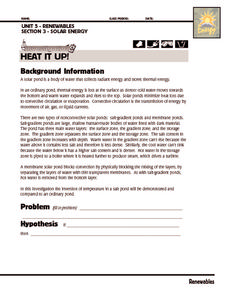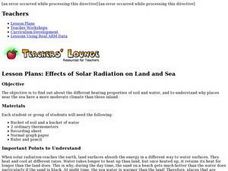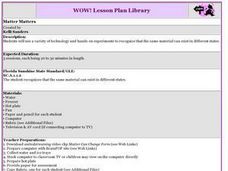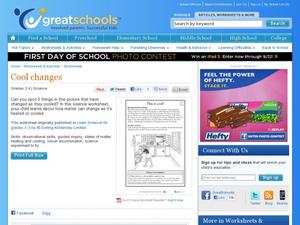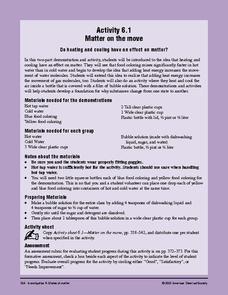Curated OER
Student Reading - The Unique Properties of Water
Without water there would be no life on this planet. Biology learners find out why by reading this handout. Create a worksheet of questions to answer after the reading. Follow it up with quick demonstrations or laboratory activities that...
Texas State Energy Conservation Office
Investigation: Heat it Up!
This demonstration of solar ponds can be used in an earth, environmental, or physical science setting. Lab groups set up a solar pond and model how it is able, due to a salt concentration gradient, to maintain heat for future use.
US Department of Energy
Effects of Solar Radiation on Land and Sea
Earth science enthusiasts experiment to compare the heating rates of soil and water. They relate their findings to the weather conditions near bodies of water. Consider also having middle schoolers measure the cooling rates to...
Curated OER
Science: Heat Quiz
In this science: heat quiz instructional activity, students answer ten questions, not interactively, about heat, water and temperature with the answers at the bottom of the screen.
Curated OER
Heat and Matter
Students explore liquids and solids by conducting in class experiments. In this matter lesson, students define the properties of matter and how heat can change those properties. Students experiment with heating objects such as butter and...
Curated OER
Matter Matters!
Second graders experiment with heating and cooling and research the states of matter (solid, liquid, gas).
Teach Engineering
Insulation Materials Investigation
Don't melt away! Pairs investigate different insulation materials to determine which one is better than the others. Using a low-temp heat plate, the teams insulate an ice cube from the heat source with a variety of substances. They...
Curated OER
Cooling With Sunshades
Students conduct research in order to find the effects of properties exposed to heat and how they change temperature. They consider the effect of sunlight upon objects that are placed outside with the help of an experiment. They also...
Curated OER
How Effective is Perspiration at Cooling?
Students collect data on the cooling of water in two different test tubes, one that is wrapped in wet newspaper and one in dry newspaper. They then relate this cooling effect to the body's perspiration.
Curated OER
Do Different Colors Absorb Heat Better?
Students work together to test how the color of a material affects how much heat it absorbs. They make predictions and take notes on their observations. They discover how engineers use this type of information.
Curated OER
Keep It Cool
Pupils complete a science experiment to study insulation, heat transfer, and permafrost. In this permafrost study lesson, students design and test a soda insulator. Pupils graph their class data and discuss the results. Students discuss...
Curated OER
Rate of Cooling Experiment
Ninth graders measure the insulation properties of different fabrics by immersing cans of water covered with fabric "socks" in an ice bath and measuring temperature changes. They then calculate heat loss and graph the data individually.
NOAA
The Great, Glowing Orb What You Will Do: Make a Solar Heat Engine
How is solar energy able to move wind and water to control the climate? Scholars explore the concept of solar energy in the first of 10 activities in the Discover Your Changing World series. They follow instructions to build homemade...
Curated OER
The Urban Heat Island Effect - Lesson 2 (Grade 5)
Fifth graders use the scientific process to examine how when various surfaces are exposed to similar environmental conditions, surface temperatures may vary. They conduct an experiment to show the relationship between surface and...
Curated OER
Matter and Heat
Students examine how heating causes substances to expand, and cooling cause it to contract. They investigate the states of matter.
Curated OER
This is Cool!
Third and fourth graders who are studying states of matter will enjoy this simple exercise. In it, they look at a picture of a girl in her kitchen, and they must circle five examples of materials that have changed states of matter as...
Curated OER
Melted Paintings
Another in the amazing series of lesson plans which use unique mediums! Students execute artwork on a non-traditional painting surface. They theorize what happen to their artwork if it is exposed to heat, then see what happens when they...
American Chemical Society
Matter on the Move
Start this mini unit on matter out by demonstrating how food coloring behaves when placed in cold and in hot water. Then have the class experiment with warm water and soap film. Pupils will learn that an increase in thermal energy also...
Virginia Department of Education
Charles’ Law
Searching for a relatively interesting way to demonstrate Charles' Law? Here is a instructional activity in which pupils heat air inside a flask and then cool the flask to quickly cool the air. They make observations about what occurs...
US Department of Energy
Thermodynamics—Teacher Guide
I'm so cool! No, you're exothermic. This thermodynamics lab unit includes an introduction, teacher demonstrations, six labs that students rotate through each class day, homework assignments, application of knowledge, and assessments....
PHET
Energy Forms and Changes
Is the ice cooling down the water or is the water melting the ice? Here is a simulation that explores thermal energy transfer with iron, brick, and water. It demonstrates the flow of energy and what happens when each material is either...
Mr. E. Science
Thermal Energy and Heat
The presentation covers Fahrenheit, Celsius, and Kelvin scales for temperature as well as conduction, convection, and radiation.
Curated OER
Heat of Combustion Lab
In this heat of combustion lab, students measure the heat of combustion for paraffin wax, butane, and cheetos. Students will apply the 1st law of thermodynamics to calculate the heat lost by the fuel and the heat gained by the water to...
Curated OER
Weather and Oceans: Uneven Heating of the Earth
Students investigate what causes the heat on Earth. In this Earth heating instructional activity, students experiment with different heat sources and determine where the Earth gathers the most heat. Students explore vocabulary words...
Other popular searches
- Heating and Cooling
- Heating and Cooling Curves
- Science Heating and Cooling
- Heating and Cooling Curve
- Heating Cooling Curves
- Heating Cooling Curve
- Heating and Cooling Energy
- Heating and Cooling Systems
- Milk Heating and Cooling
- Heating and Cooling Water
- Heating Adan Cooling Curves
- +Heating and Cooling



